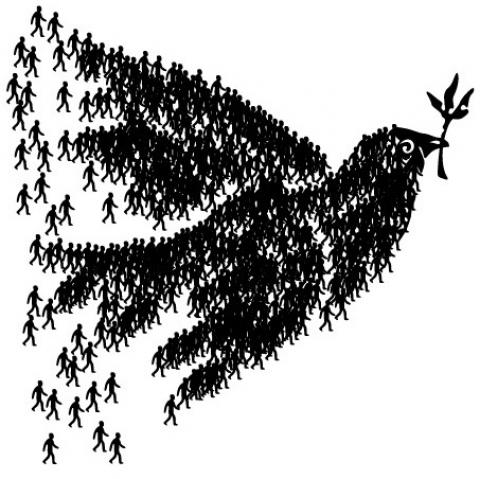
The Global Fragility Act, signed into law in December 2019, was supported by many faith-based advocacy groups as a measure to more effectively prevent violence through peaceful means for vulnerable communities around the world. The following article was published in the January-February 2020 issue of NewsNotes.
On December 20, President Donald Trump signed the Global Fragility Act into law as part of a $1.4 trillion government spending package for 2020. The Act will enable the U.S. government to more effectively prevent violence around the world through peaceful means, rather than responding only once violence has begun. At a time when partisan divisions and political gridlock dominate headlines, the inclusion of the Act in the spending bill demonstrates the ability of civil society groups, including faith-based groups, to garner bipartisan support for key violence-prevention and peacebuilding measures.
The Global Fragility Act was developed by civil society groups working on the ground in fragile countries and conflict zones around the world as a mechanism to allow the U.S. to better partner with them in meeting the needs of vulnerable and impoverished communities threatened by violence. A coalition of civil society groups led by Mercy Corps and the Alliance for Peacebuilding advocated for the Act, successfully convincing lawmakers of the need for a more effective U.S. response to fragility and potential violence.
According to Mercy Corps, the Global Fragility Act “treats the causes of violence rather than the symptoms” through several important accomplishments. These include focusing U.S. foreign assistance on preventing violence in fragile countries, increasing transparency and accountability by mandating biennial reports on implementation of the Act to Congress, strengthening research on the effectiveness of foreign assistance and diplomatic approaches to preventing conflict, and dedicating 1.15 billion dollars to conflict prevention and peacebuilding in fragile countries.
A country is considered fragile when the government is unable to respond effectively to crises such as economic decline, violent conflict, or natural disaster. Poverty, violence and environmental crises are interrelated, each contributing to the others, and they are both causes and effects of fragility. These problems weaken the state, which is in turn unable to effectively protect communities from their devastating impacts. The Global Fragility Act empowers the U.S. to more effectively prevent this spiraling effect through early, non-military intervention coordinated by the Department of State and the U.S. Agency for International Development (USAID).
Building on Pope John XXIII’s famous exhortation, “If you want peace, work for justice,” Pope Francis reminds us that we cannot effectively address social concerns without also addressing environmental crises. By shifting resources to mitigating fragility, the Global Fragility Act allows U.S. government peacebuilding efforts to better reflect the idea of integral ecology, a concept promoted by Pope Francis in Laudato Si’.
Perhaps the most dramatic result of fragility and violence around the world is record-level mass migration and displacement. Nearly seventy million people are on the move, fleeing violence and persecution. While debates rage in the U.S. about immigration policy at home, the violence-prevention focus of the Global Fragility Act offers U.S. agencies abroad important tools for addressing the root causes of migration.
Together with the Catholic Nonviolence Initiative (CNI), coordinated by Pax Christi International, the Maryknoll Office of Global Concerns works to highlight effective alternatives to violence, or nonviolent tools such as diplomacy and increasing civic engagement. By emphasizing violence prevention through diplomacy and development programs rather than reacting to violence after it erupts, often through military intervention, the Global Fragility Act suggests a deepening understanding of and commitment to nonviolence and a just peace approach to conflict.
The Act received bipartisan sponsorship in both the House and Senate before being added to the 2020 government spending package. Civil society groups will now monitor the Act’s implementation, giving government agencies feedback and advocating for improvements and continued funding. Meanwhile, MOGC and partner organizations celebrate the passage of this crucial act and the positive impact it promises for vulnerable communities across the globe.
